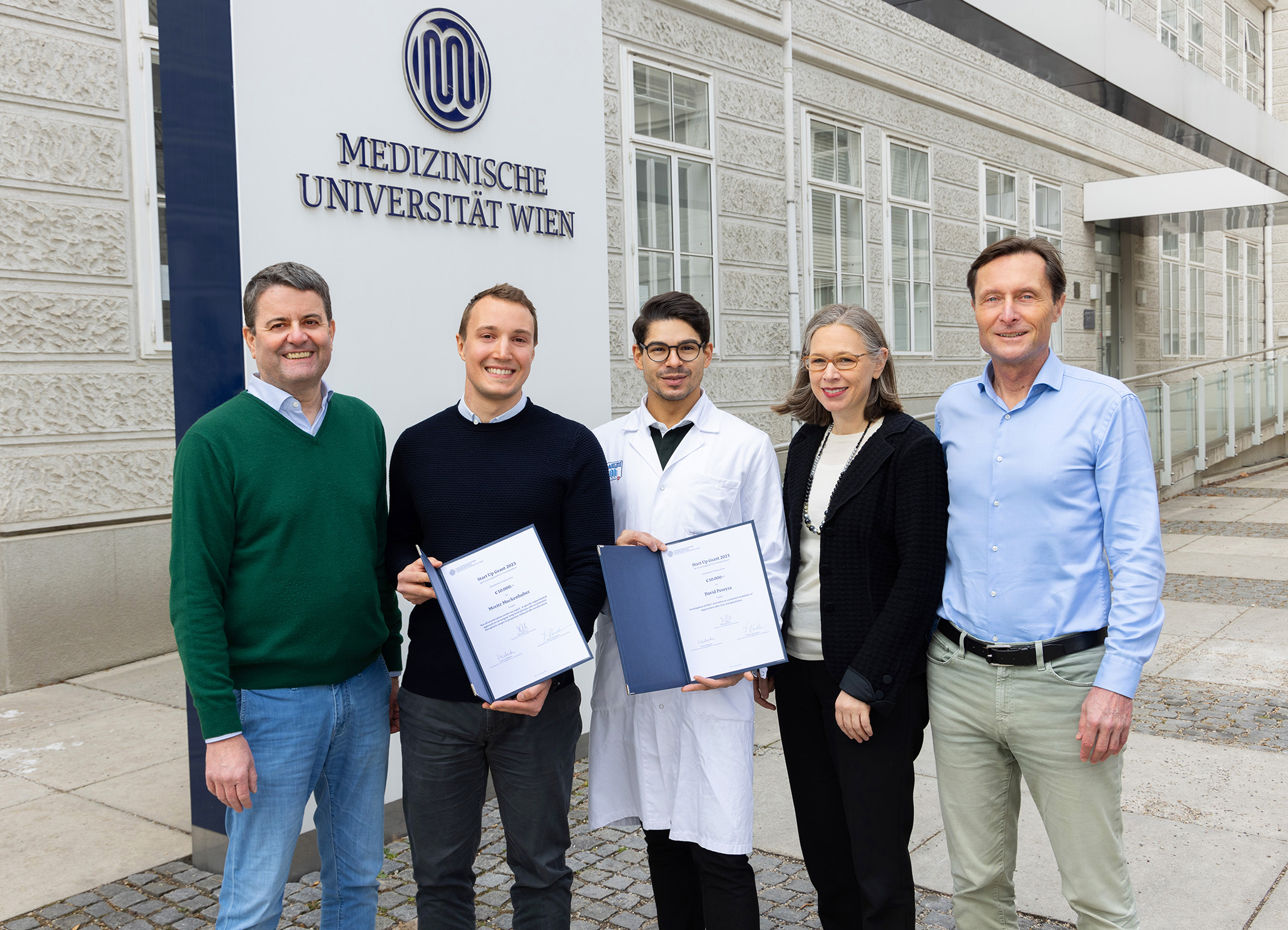Start-up Grants 2023: Moritz Muckenhuber and David Pereyra

Moritz Muckenhuber and David Pereyra receive grants for their projects on pregnancy-induced allosensitisation and liver transplantation, respectively.
The grants are intended to generate new research results that will serve as the basis for future third-party funding. The awards were presented by Michaela Fritz, Vice Rector for Innovation and Research, and the coordinators of the Transplantation Research Platform, Rainer Oberbauer and Thomas Wekerle.
About the project by Moritz Muckenhuber
During pregnancy, the maternal immune system encounters paternal HLA antigens carried by the semi-allogeneic foetus. As a result of the resulting immune reaction, two thirds of women develop HLA-specific antibodies. These antibodies can persist for decades and limit donor organ compatibility in the context of transplantation. In clinical reality, pregnancy-related allosensitisation therefore has implications for women's access to transplantation.
Moritz Muckenhuber will establish a mouse model to investigate the immunological mechanisms that cause and maintain pregnancy-induced allosensitisation. The results will lead to the identification of new therapeutic strategies specifically targeting B-cell and plasma cell populations that maintain pregnancy-induced HLA (MHC)-specific antibodies. Subsequently, the most promising therapeutic approaches will be investigated in a mouse model for heart transplantation.
Overall, Moritz Muckenhuber hopes that this project will help improve transplant care for presensitised patients.
About Moritz Muckenhuber
Moritz Muckenhuber is an MD-PhD candidate in Thomas Wekerle's research group at the Department of Transplantation at MedUni Vienna's University Department of General Surgery. He joined MedUni Vienna's MD-PhD programme in 2018 and completed his medical studies in 2019. During his PhD in immunology, Moritz Muckenhuber is researching therapeutic strategies to overcome allograft rejection reactions caused by costimulation blockade.
About the project by David Pereyra
Liver transplantation is a unique treatment option for a large number of patients with end-stage liver disease, resulting in lower mortality and longer overall survival in this patient group. Although intra- and perioperative management has been significantly revolutionised over the past decades, a large proportion of patients are still affected by early allograft dysfunction (EAD) due to ischaemia/reperfusion injury and impaired liver regeneration. Early allograft dysfunction is one of the most important factors influencing outcome after liver transplantation and is associated with increased morbidity and early mortality in affected individuals. Novel methods of preoperative perfusion of the liver graft have been shown to reduce the effects of ischaemia/reperfusion and allow a more thorough assessment of liver viability prior to transplantation, reducing the incidence of EAD and biliary complications. To date, however, there is no causal treatment option for EAD, as regeneration patterns are still not fully understood and successful therapeutic interventions are lacking.
In this context, yes-associated protein 1 (YAP-1) has recently been investigated as an important proregenerative factor after toxic injury and loss of functional liver tissue. Most studies investigated this connection in rodent models. Here, induction and/or activation of YAP-1 led to enhanced liver regeneration after partial hepatectomy. In addition, an improved outcome was observed after acute toxic liver injury. It is noteworthy that the regeneration-promoting effect of YAP-1 is based on the maintenance of bile duct integrity rather than hepatocyte-dependent mechanisms, which is a particularly interesting target for the study of liver transplantation, as postoperative biliary complications are known to be common.
In this project, David Pereyra
(1) will investigate YAP-1 induction and activation in patients undergoing liver transplantation: in undergoing liver transplantation and assess potential associations with postoperative outcome,
(2) elucidate the dynamics and relevance of YAP-1 activation during normothermic machine perfusion longitudinally, and
(3) investigate a potential beneficial effect of YAP-1 activation on hepatic conditioning by pharmacological intervention in a group of three livers that were not viability tested and subjected to normothermic machine perfusion prior to transplantation.
About David Pereyra
David Pereyra completed his studies in the PhD programme (N094) Vascular Biology at the Institute for Vascular Biology and Vascular Biology and Thrombosis Research at the Centre for Physiology and the University Department of General Surgery (Supervisors: Alice Assinger and Patrick Starlinger). For his dissertation entitled "Investigation of hemostatic biomarkers for risk prediction in selected human diseases", he was awarded the 2022 Award of Excellence by the of Excellence by the Ministry of Science.
